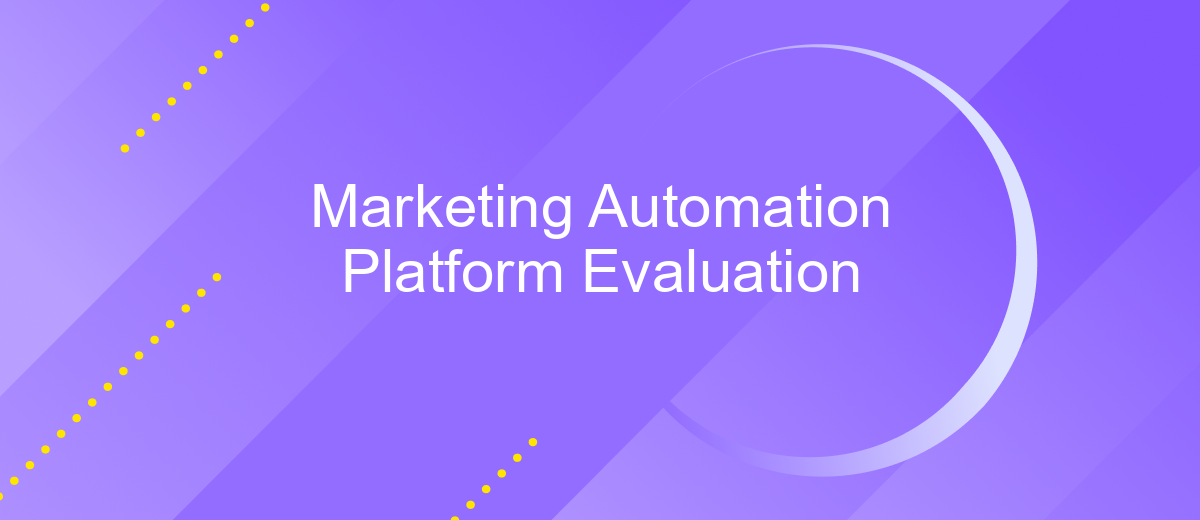Marketing Automation Platform Evaluation
In today's fast-paced digital landscape, choosing the right marketing automation platform is crucial for businesses aiming to streamline their operations and enhance customer engagement. This article delves into the key factors to consider when evaluating different platforms, including features, scalability, and integration capabilities. By understanding these elements, businesses can make informed decisions that align with their marketing goals and drive sustainable growth.
Defining Your Marketing Automation Needs and Objectives
Before diving into the selection of a marketing automation platform, it is crucial to clearly define your marketing needs and objectives. Understanding these aspects will guide your decision-making process and ensure the chosen solution aligns with your business goals. Start by assessing your current marketing strategies and identifying areas where automation could enhance efficiency and effectiveness.
- Identify key marketing tasks that require automation, such as email campaigns, social media management, or lead nurturing.
- Determine the specific goals you aim to achieve with automation, like increasing lead conversion rates or improving customer engagement.
- Consider the scalability of the platform to accommodate future growth and evolving marketing strategies.
- Evaluate the integration capabilities with existing systems to ensure seamless data flow and operational harmony.
Once your needs and objectives are clearly outlined, prioritize them to facilitate a focused evaluation of potential platforms. This clarity will not only streamline the selection process but also empower your team to leverage marketing automation effectively, driving measurable results and maximizing return on investment.
Key Features and Capabilities Evaluation

When evaluating a marketing automation platform, it is crucial to consider its key features and capabilities. One of the primary aspects is the platform's ability to integrate seamlessly with existing systems and tools. A robust platform should offer extensive integration options, allowing businesses to connect with CRM systems, email marketing tools, and social media platforms effortlessly. For instance, services like ApiX-Drive can facilitate these integrations, ensuring a smooth data flow and enhancing operational efficiency.
Another important feature to assess is the platform's automation capabilities. This includes the ability to automate repetitive tasks, such as email campaigns, lead scoring, and customer segmentation. Advanced analytics and reporting features are also vital, as they provide insights into campaign performance and customer behavior, enabling data-driven decision-making. Additionally, user-friendliness and scalability are key considerations, ensuring that the platform can grow with the business and be easily navigated by team members of varying technical expertise. By focusing on these features, businesses can select a marketing automation platform that aligns with their strategic goals and drives long-term success.
Platform Integration and Compatibility Assessment

When evaluating a marketing automation platform, a critical consideration is its ability to seamlessly integrate with existing systems and ensure compatibility across various tools and applications. Successful integration enhances data flow, reduces manual processes, and maximizes the platform's potential.
- Evaluate API capabilities: Ensure the platform offers robust API support for smooth data exchange with other systems.
- Check CRM compatibility: Confirm that the platform integrates well with your current CRM to maintain a unified customer view.
- Assess third-party app support: Determine if the platform supports integration with essential third-party applications like social media, analytics, and email marketing tools.
- Review data synchronization: Verify that the platform enables real-time or scheduled data synchronization to keep information up-to-date across systems.
- Investigate scalability: Ensure the platform can scale with your business needs and accommodate future integrations without significant disruptions.
By focusing on integration and compatibility, businesses can ensure their marketing automation platform not only fits within their current technological ecosystem but also supports future growth and innovation. This strategic alignment can lead to improved efficiency, better customer insights, and a more cohesive marketing strategy.
Vendor Reputation and Support Analysis

When evaluating marketing automation platforms, vendor reputation and support are crucial factors to consider. A vendor with a strong reputation often indicates reliability and a history of satisfied customers. Researching customer reviews, industry awards, and case studies can provide insights into a vendor's standing in the market.
Support services are equally important, as they ensure smooth operation and quick resolution of any issues that may arise. Comprehensive support can significantly impact the overall user experience and platform efficiency. It is essential to understand the level of support offered by the vendor, including response times and availability of resources.
- 24/7 customer support availability
- Dedicated account managers
- Comprehensive knowledge base and training resources
- Community forums and user groups
By thoroughly analyzing both the reputation and support offerings of a vendor, businesses can make informed decisions that align with their operational needs and strategic goals. A well-regarded vendor with robust support services can enhance the effectiveness of a marketing automation platform, leading to better outcomes and a higher return on investment.


Pricing and ROI Considerations
When evaluating a marketing automation platform, pricing is a crucial factor. It's essential to consider not only the initial cost but also the scalability of the platform as your business grows. Look for transparent pricing models that align with your budget and long-term goals. Some platforms offer tiered pricing based on the number of users or features, so ensure you understand what each tier includes. Additionally, consider any hidden costs, such as setup fees or charges for additional support. A clear understanding of the pricing structure will help you make an informed decision.
Return on investment (ROI) is another critical consideration. To maximize ROI, assess how the platform can streamline your marketing efforts and increase efficiency. Tools like ApiX-Drive can be invaluable, offering seamless integration with various services, reducing manual tasks, and enhancing data flow. By automating repetitive processes, you can allocate resources more effectively and focus on strategic initiatives. Evaluate the platform's analytics capabilities to measure performance and adjust strategies accordingly. Ultimately, a well-chosen marketing automation platform should deliver measurable results that justify the investment.
FAQ
What is a Marketing Automation Platform (MAP) and why is it important for my business?
How do I choose the right Marketing Automation Platform for my business?
Can a Marketing Automation Platform integrate with my existing systems?
How can I measure the success of my marketing automation efforts?
What are some common challenges in implementing a Marketing Automation Platform?
Routine tasks take a lot of time from employees? Do they burn out, do not have enough working day for the main duties and important things? Do you understand that the only way out of this situation in modern realities is automation? Try Apix-Drive for free and make sure that the online connector in 5 minutes of setting up integration will remove a significant part of the routine from your life and free up time for you and your employees.

